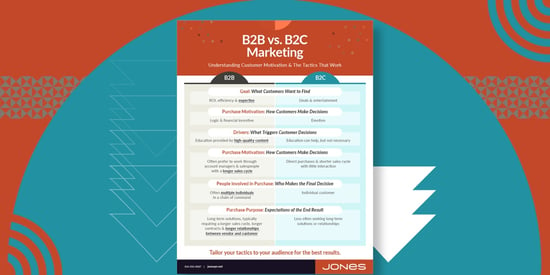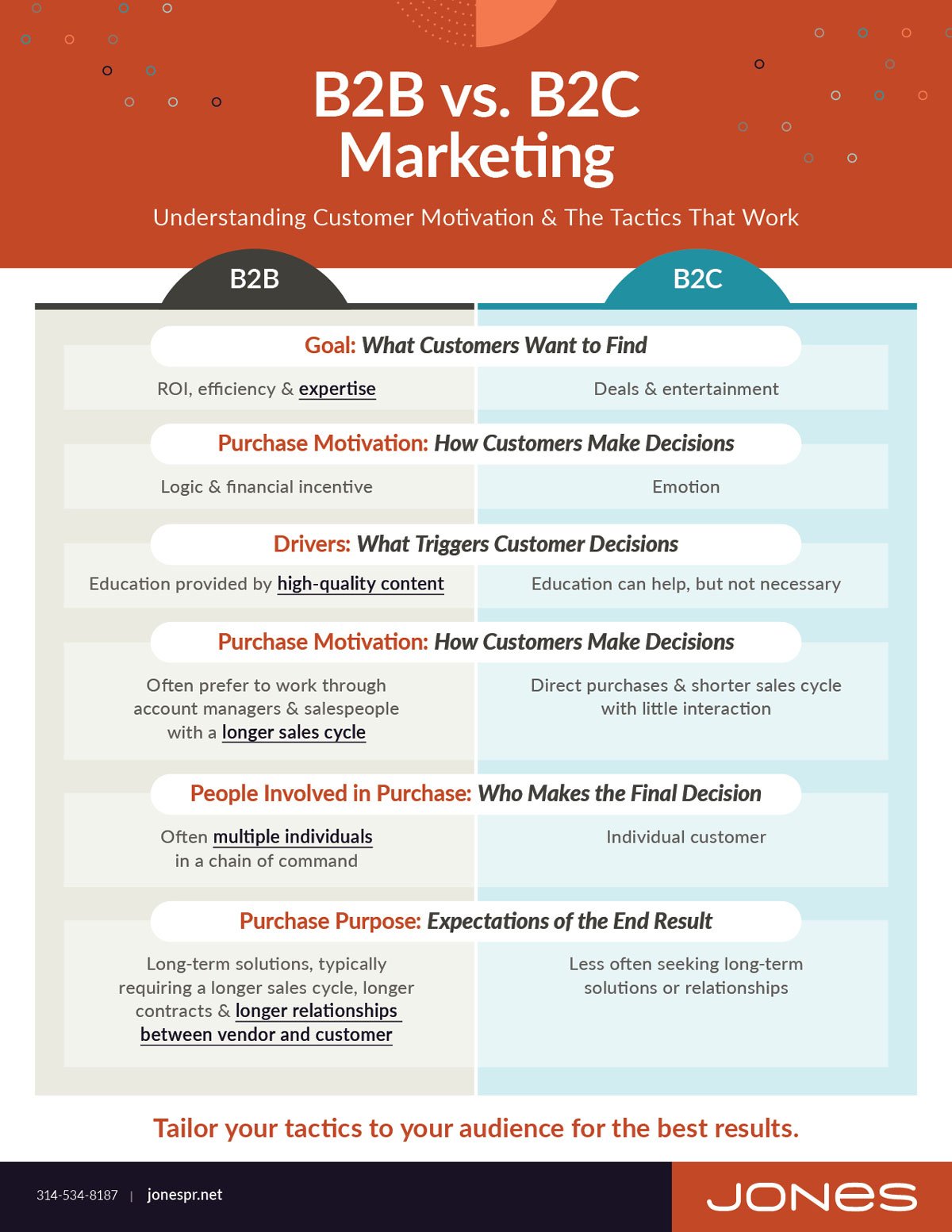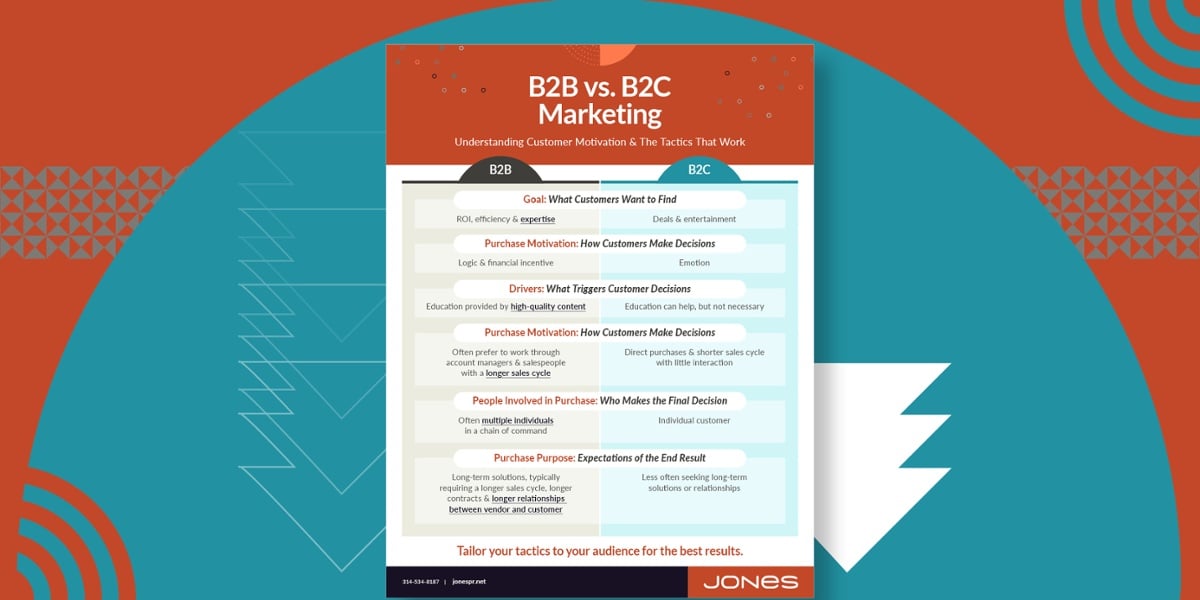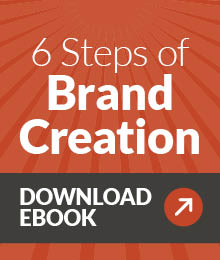Understanding the Differences Between B2B & B2C Marketing (infographic)

It often seems to me that the majority of marketing discussions online center around the approaches and tactics that are best suited to B2C marketing strategies—they tend to focus on the world’s biggest brands, almost all of which market primarily to individuals.
But the catchy, entertainment-focused style that characterizes much popular B2C marketing simply won’t work for the field in which many of us operate, which is the often-overlooked, but absolutely essential, world of B2B marketing. You didn’t see B2B brands splashed across the screen during this month’s Olympic Games or NFL Superbowl, but the need to reach B2B customers is just as urgent and, in many ways, much more complicated than triggering an impulse buy of a Mountain Dew Kickstart on the way to the gas station checkout line.
In a recent blog post, HubSpot highlighted a number of statistics surrounding B2B marketing, with its emphasis on educating the customer, nurturing leads through a long, complex buying cycle and understanding all of the personas involved in the purchase decision.
Before we talk about the tactics essential to successfully driving brand awareness, lead generation and sales for B2B brands, let’s review the differences between B2B and B2C customers and motivations.

What do B2B customers want?
Deals and eye-catching entertainment don’t work in B2B marketing. When making a business purchase decision, the determining factors are typically ROI, efficiency and expertise.
B2B marketers must convince prospects that their product or service will meet the needs of the customer, who is often focused on meeting their own KPIs. They may purchase new software because it automates a process allowing for a 20 percent increase in production, or they may look for an engineering firm with experience in building precisely the type of production facility they plan to add. B2B customers aren’t typically looking for fun or trends or novelty—they want to know that their purchase decisions will have a positive impact on their own bottom line.
How do B2B customers make decisions?
If the focus is on improving the bottom line, then you know that emotion isn’t going to be the key determination in B2B decision-making (it can still play a role, but not the major one). Instead, B2B customers lean on logic and financial incentives in making purchase decisions.
What triggers B2B customer decisions?
So how do you reach those B2B customers to help them come to the logical decision to buy your product/choose your service? Education.
This is where content marketing comes in. B2B customers do their research, and while most also look to third-party content for information, by including a dedicated content strategy in your marketing and public relations approach, you can help control the message and ensure that the information customers are looking for is available for them to find.
How do B2B customers make a purchase?
Most B2B purchase decisions tend to be for big ticket items that require a long lead-up from budgeting, to research, to narrowing down choices, and that often involves direct contact with account managers or salespeople. It often starts, however, with a web search, where B2B customers may first do up to 80 percent of their research before having (or wanting) direct contact with a vendor.
The content available to customers in that research stage should be designed for a gradual building of trust and need through lead nurturing. B2B marketing strategies need to take the long view of guiding prospective customers through awareness, consideration and decision levels of the buyers’ journey.
Who makes the final B2B purchase decisions?
B2B purchase often involve presenting options to a leadership team that will make the ultimate decision. There may be a number of different roles involved in the purchase: executive level finance leaders, department management, supervisors and end users may all have the opportunity to offer input on a purchase, and each may have different pain points to address. This means that the content discussed in earlier questions must be tailored to each of those buyer personas and the questions most important to their individual success.
What do B2B buyers expect as the end result?
Unlike many consumer purchases, which tend to be for consumable goods with short lives, the majority of B2B purchase decisions result in significant investments in products or services that are meant to be long term, whether that is a purchase of durable machinery, SaaS software that will scale with a growing company or an enduring relationship with a partner or consultant.
Creating an effective B2B marketing strategy requires a different approach than marketing consumable consumer goods that sell largely on emotion and impulse. Developing your B2B marketing program requires high quality content designed to educate all the customer personas you need to reach, nurturing them along the buyers’ journey from awareness through to that final sales decision. Are you looking for a partner with a wealth of experience in B2B marketing and communications? JONES is here to help, with a background in reaching business decision makers in multiple industries from enterprise software to healthcare and fintech. Let’s talk about how we can enable your B2B marketing strategy. Schedule a consultation today.
-1.png?width=1652&height=294&name=Jones(RGB)-1.png)










![How B2B Marketers Distribute Content [infographic]](https://www.jonespr.net/hs-fs/hubfs/How%20B2B%20Marketers%20Distribute%20Content%20%5Binfographic%5D.jpg?width=352&name=How%20B2B%20Marketers%20Distribute%20Content%20%5Binfographic%5D.jpg)

